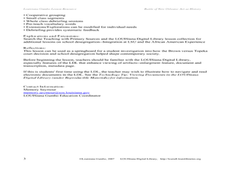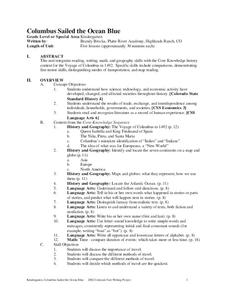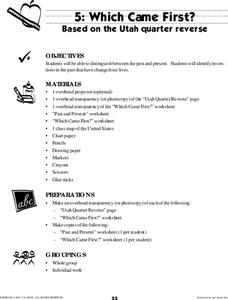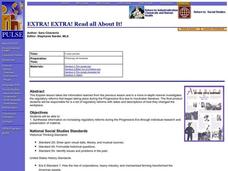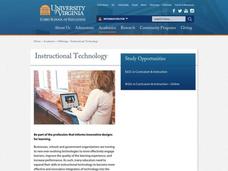Curated OER
Can you Prove it?
Tenth graders examine how primary source documents help authors and museum curators interpret historic events. In this social studies lesson plan, 10th graders research primary source documents. Students create a powerpoint to present...
Curated OER
Cane River Civil Rights: A Native American Perspective
Students interpret historical evidence presented in primary resources. In this civil rights lesson, students examine the civil rights struggle from a Native American perspective. Students analyze documents and write journal entries that...
Curated OER
Reaction to Pearl Harbor: Japanese American Internment Camps
This student produced presentation provides a great exploration of the Japanese-American Internment Camps during World War II, but should be used primarily as a discussion tool. The presentation includes photos, audio and pictures of...
Curated OER
The Persian Wars: Greece's Finest Hours
Maps and photographs help contextualize the Persian Wars in this straightforward presentation. These slides detail the motives and major events of the war between Persia and Greece, making it ideal for a lecture on ancient Greek politics...
Core Knowledge Foundation
Columbus Sailed the Ocean Blue
Young adventurers embark on a journey, setting sail along the blue ocean with Christopher Columbus. Teachers will find that this unit makes their lesson planning smooth sailing!
Curated OER
Origin of the Modern Summer Games
Students research the ancient Olympic Games. In this Olympic Games lesson, students discuss Pierre de Coubertin, Greek culture, and ancient Olympia. Students complete two readings. Students write an essay about the spirit of Olympism,...
Curated OER
Then and Now
First graders investigate the past and present by analyzing a group of images. In this community history lesson, 1st graders read the story Sarah Morton's Day by Kate Walters and discuss the time frame of the story. Students create a...
Curated OER
Interview the Elders
Pupils prepare a list of questions about the past and present in regards to dealing with waste and the natural resources. They conduct interviews with tribal Elders and record their statements.
Curated OER
World Leaders Word Search Worksheet
In this famous people worksheet, students read 15 names of past and present world leaders. Students find these names in a word search puzzle.
Curated OER
Which Came First?
Students distinguish between the past and present with the concept of the Utah Quarter Reverse. They make lists that give possible meanings of the terms "past" and "present". Then students write reflectively from research about the...
Curated OER
Comparing Chores - Past and Present
Students read "Sarah Norton's Day" and explore the responsibilities of colonial day children. As a group, students list the responsibilities they have at home. Using a Venn Diagram, they compare and contrast their chores and...
Curated OER
The Jewish Community in America, Past and Present
Students examine the beginnings of the Jewish Community in America. Using the internet, they examine the role of Jewish organizations and resources that are available to them. They compare and contrast the view of the community they...
Mary Pope Osborne, Classroom Adventures Program
The Backpack Travel Journals
Strap on those backpacks, it's time to travel through history with this literature unit based on the first four books of The Magic Tree House series. While reading through these fun stories, children create story maps, record interesting...
Curated OER
Roads of the Past and Present
Third graders compare the paths taken by the pioneers with those taken today. They trace the development and emergence of culture in indigenous communities.
Curated OER
PARAMILITARY VIOLENCE AND THE CONFLICT IN NORTHERN IRELAND
Students examine documents to reconstruct the past, employ processes of critical historical inquiry to reconstruct the past, analyze aspects of the Northern Iereland conflict through perspectives of documents, and write a short position...
Curated OER
EXTRA! EXTRA! Read all About It!
Students are able to synthesize information on increasing regulatory reforms during the Progressive Era through individual research and presentation of material. They are responsible for a list of regulatory reforms with dates and...
Curated OER
They Called Him Sequoyah
Students become familiar with George Gist and his life as a Cherokee. In this Cherokee lesson, students research the ways people have communicated in the past and presently. Students recognize that better communication could have...
Curated OER
Man's Continuing Inhumanity to Man
Students explore social justice issues. In this human justice lesson, students examine the meaning of words associated with minority groups and investigate genocide throughout history.
Curated OER
Show Me the Money: Labor/Management Issues in Professional Baseball
Learners study the baseball players in the past and present and see how the union played a part in lives. In this labor lesson students analyze documents and identify the effects of the different markets on labor salaries.
Curated OER
Pictures from Korea: Shards of an Almost Forgotten Past
Learners explore the Korean War through photography. In this Korean War lesson, students examine photographs taken by a soldier and respond to question about them.
Curated OER
Travel the Trail: Nebraska quarter reverse
The life of the pioneers was much different than the life a family today. Pupils use a "Now and Then" worksheet to compare and contrast how travel has changed over the last 100 years. Worksheets are included.
Curated OER
The White House
Fifth graders visit the White House to make connections dealing with the Presidency: Past, Present, and future.
Curated OER
The Brief American Pageant: America on the World Stage
America's presence in Alaska and the Caribbean are the focus of this short presentation. Two detailed maps help to illustrate America's growing influence in the regions past its continental borders, which could supplement a more thorough...
Population Connection
Meeting Human Needs
How to meet the needs of people around the globe—a question many ask. The fifth in a six-part series about human population and its effects on the globe, the eye-opening lesson includes discussion, a homework activity, and an in-class...



